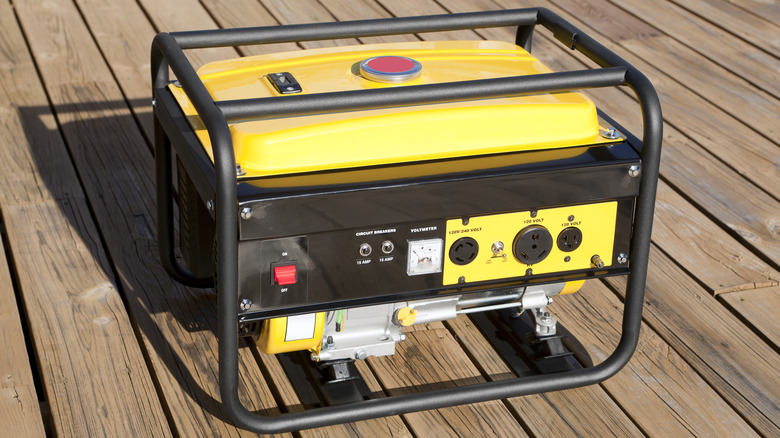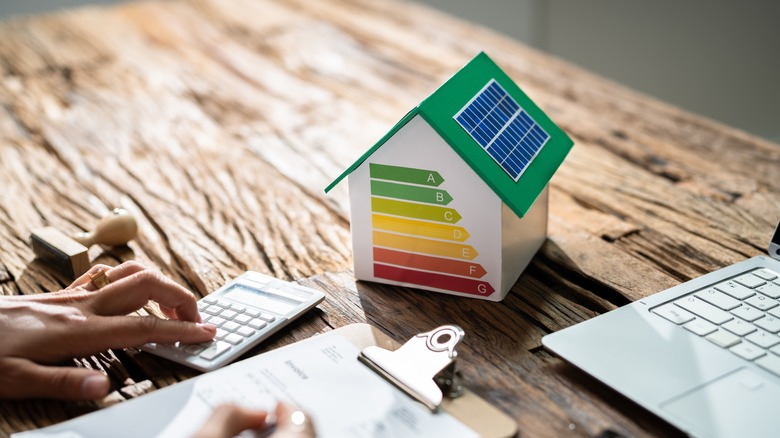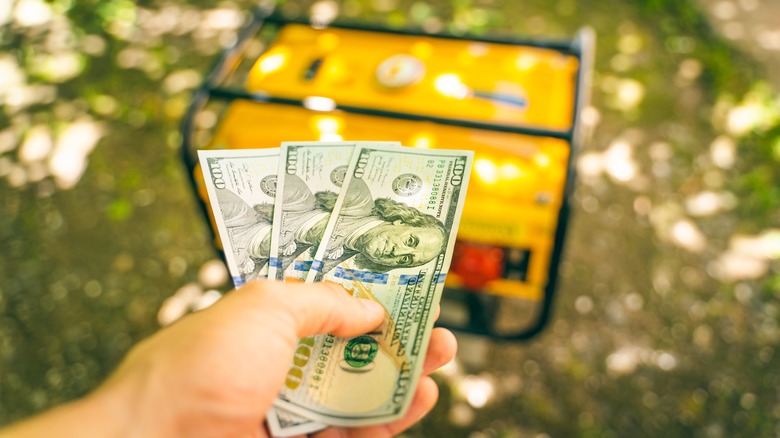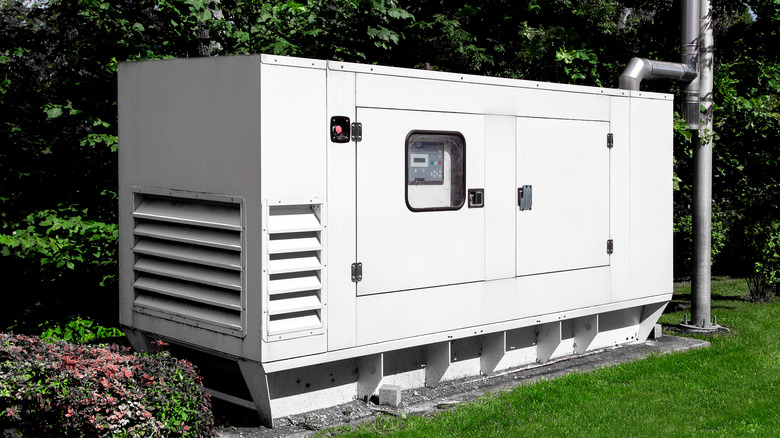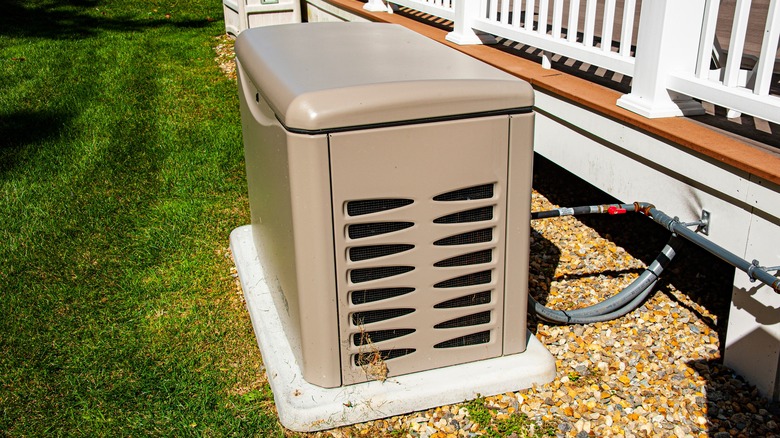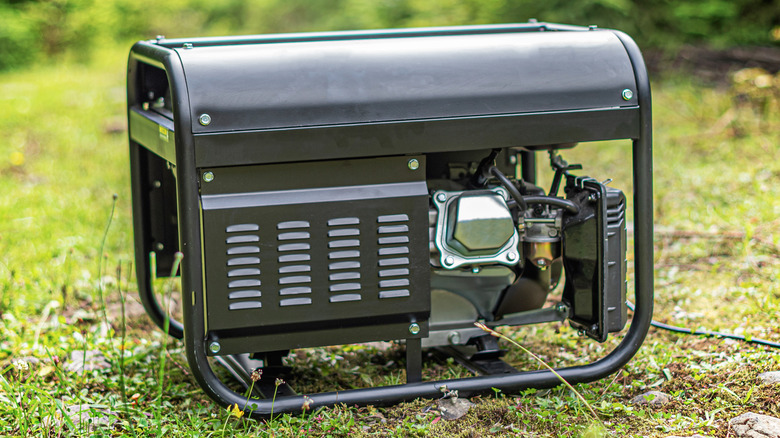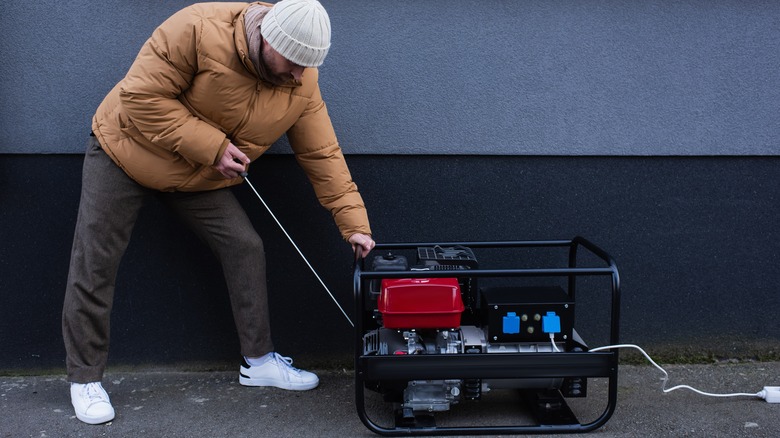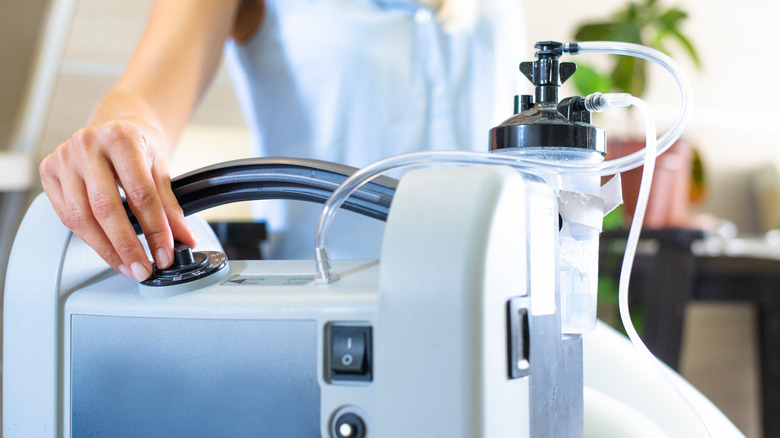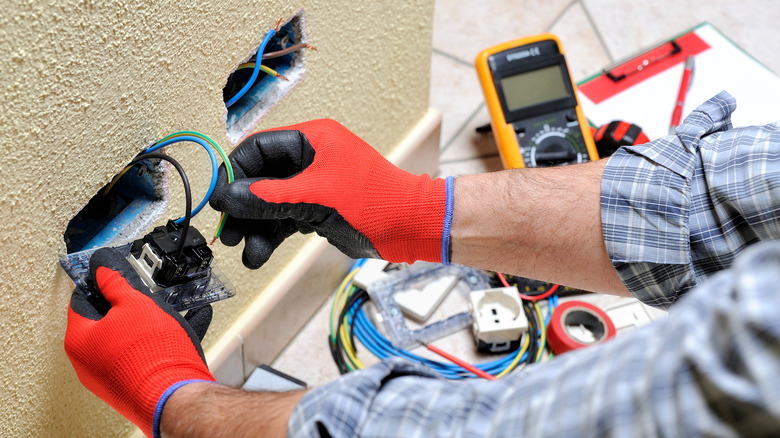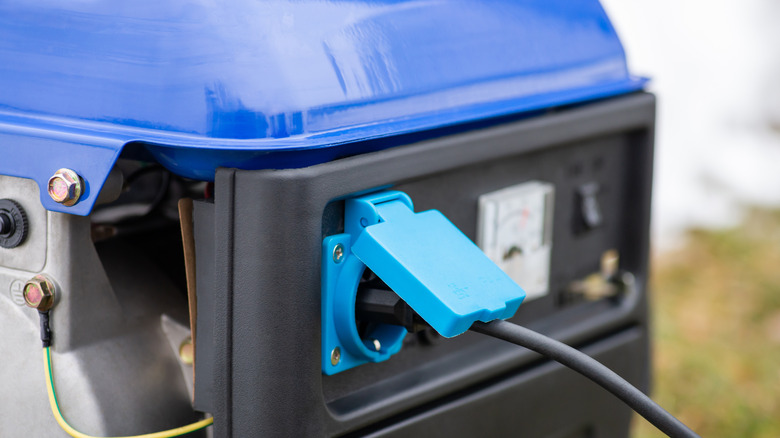How To Choose The Right Generator For Your Home
Dealing with the expense and bother of setting up a home generator can seem like overkill until the power is out and you're unable to charge your phone, the food in your fridge is spoiling, your septic pump isn't working, your basement is flooding, and that Zoom job interview is in 20 minutes. Convinced yet? Now it's just a matter of figuring out which generator is the best fit for your needs.
Hang on, though — what is this thing, anyway? At its most basic, a generator converts motion into electrical energy and provides it in a form that can be used or stored easily. We're broadly discussing devices that can be used to provide power in case of an outage, so we can use a slightly broader definition here to include devices that convert AC power to DC and store it in a battery.
Generators are typically reasonably efficient in that they convert mechanical energy to electrical energy without a lot of loss to heat. Still, keep in mind that this doesn't mean they're comparable to main electricity in terms of cost. Your power company will always supply electricity much more cheaply than any consumer generator can — until, of course, something happens to your connection to the energy grid. If you need to be prepared for a loss of power, here is how to choose the right generator for your home.
Figure out how much power you need
You're going to start by figuring out how much power you use at any given moment during a typical day. This will be an amazingly inaccurate number, but it will provide you with a sense of the power you need to produce during an outage. Then, you'll make some decisions about whether all that power is necessary or identify which particular appliances are critical during an outage. This calculation will have an enormous impact on your decision-making about a generator, mostly in terms of the size and cost of the generator. More power requires a bigger generator, which costs more.
It's a useful exercise to try to track down all of the frequently (or constantly) used power loads in your home. To simplify this process, there are wattage calculators available online, and good ones will include default values (or a choice of default values) for common items like a furnace, television, electric range, or garage door opener. Did you think about the garage door opener before now? We didn't, either. Next, make a list of the things you consider critical even during a power outage, and do a separate wattage calculation for that list.
You'll also need to think about starting load, which is the amount of power a device draws when you first start it. Anything with an electric motor will momentarily have power requirements 2-3 times their normal running load. Devices that solely use DC power will typically have starting wattages that match their running wattages. This can easily overwhelm a portable generator, but fortunately, most are rated with both starting and running wattages.
How much are you willing to spend?
The decision you're working toward here is whether to run your whole house on a generator or just select appliances. From there, you can determine what kind of power requirement you will have for your generator, which will pretty quickly lead you to the budget question. It's a key piece of information that can rule out a lot of options and help you maximize the choices remaining.
Home generators can range in price from $900 (or even less for very small models) to $12,000 or more, and considerably more if you use your Ford electric truck as a generator. The generators at the upper end of this range are usually standby models that are permanently installed and have the option of automatically swinging into operation when there's a power outage. The less expensive devices are normally portable generators.
There are a couple of other items to keep in mind when estimating costs. If you plan to connect your generator to your home's electrical circuits, you'll need either a transfer switch or an interlock to control the source (utility or generator), as they must not be operated simultaneously. An interlock typically costs between $370 and $800, with an average of $700, while transfer switches will vary wildly depending on the load they can handle, but it's safe to budget $1000 at a minimum.
Don't forget to factor in power cords, which can be surprisingly expensive. You'll need a 10-gauge cord to extend a 20-amp circuit 100 feet, which can cost almost $200.
Determine the type of generator you need
All of this leads to the big question — do you need a permanently installed standby generator, a portable generator, or something else? Based on your power needs, your budget, and the likelihood of a lengthy power outage in your situation, you'll choose between standby, portable, and inverter generators. Inverter generators are basically devices that store DC power, often converted from mains electricity, and convert it back to AC when in use. Inverter models like the Jackery Explorer line are very convenient, but are only appropriate for operating a fairly small load for a fairly short time.
Standby generators have a permanent home, typically near your point of electrical service entrance. They will have a fuel source that's connected and operable in advance and at all times, and they usually can power a large subset of your home's electrical circuits through your load center, the circuit breaker panel.
When you use a portable generator, you must move it into place and connect it to your devices and appliances at the time of the outage. You'll connect it to utilities like propane or natural gas at the time of use or provide it with gasoline or something similar. Portable generators typically include 120-volt receptacles, and larger ones include 240-volt connections for operating large appliances or, conceivably, your circuits through an interlock or transfer switch. While it is possible to connect a portable generator to a home's circuits by backfeeding, it's an unacceptable choice from a safety point of view and illegal in many jurisdictions.
Figure out which fuel type is best for you
Do you have natural gas or propane readily available to your home through your utility provider? Do you have a huge bank of solar panels? Do you have a place to store large quantities of gasoline or diesel fuel? These and other questions will drive your choice of generator fuels. It's a complicated choice, to be sure.
Gasoline, which powers many home generators, most small portable generators, and at least one electric vehicle charger, is efficient but inconvenient in terms of safe storage and the length of time it can be stored. It also might be difficult to acquire during the sorts of emergencies that precipitate a power outage. Diesel fuel generators are efficient and durable but more expensive. Diesel has a longer shelf life than gasoline, but diesel generators are more easily affected by old, degraded fuel.
Liquefied petroleum gas (LP gas, or propane) is another common choice for generators. It's typically stored on-site in large tanks such as those used for HVAC systems or smaller tanks used for grills. Even though it's not very efficient, it is convenient to buy and store compared to gas and diesel. Even more convenient is natural gas, which is typically supplied to a home via a pipe from the utility company, the ideal for ease of use because the supply is unlimited, practically speaking. However, you will be tethering yourself to the location of the natural gas line, which means you can't take your portable generator out to the back forty to run some electric saws.
Even more perfect are bi- and tri-fuel options, which allow you to switch between gas, propane, and natural gas.
Where would you put a portable generator?
Give this one a lot of thought because sticking a generator in the wrong place could be a life-threatening mistake. According to the Consumer Product Safety Commission, a 5kW generator can emit as much carbon monoxide (CO) as 450 "idling mid‐size late 1990s model cars." In fact, CO from portable generators kills around 75 Americans per year, and it can kill in as few as five minutes. As a result, Consumer Reports is unusually (and appropriately) hard-nosed about generators and automatically grades any generator without an automatic CO safety shutoff as "poor."
Do not run a generator in any interior space, regardless of whether it's unoccupied or open to the outdoors. Don't run one in a covered location adjacent to an occupied building, and don't run one within 20 feet of a house at all. Direct the generator's exhaust away from your home and monitor wind direction to make sure it's not being blown back your way.
Noise is also a consideration. Some generators can be deafening, and tensions run high after the 100th time your kid doesn't hear you or your spouse asks you to repeat yourself. Isolating it properly to defend against carbon monoxide should help with noise, but having an empty room between you and the generator at all times is probably worthwhile.
In an emergency, will you have time to deal with a portable generator's demands?
You need to consider where you would store a portable generator when not in use and how you'll get it from one place to another. You don't want to drag a 250-pound generator through the mud in the middle of a hurricane with no lights around to keep you from constantly slipping and falling. Generators can be challenging to deal with under ideal circumstances, and emergencies aren't ideal circumstances. There's usually a lot going on during a power outage that can be complicated to manage.
Someone with children, medically vulnerable parents, temperature-sensitive livestock, and other situations in their households might reasonably rule out a portable generator if they're unlikely to be able to tend it properly. It might seem like a power outage will actually free up time by limiting some common distractions — like cable news and online mahjong tournaments — but the reality is that common tasks can take many times longer than usual to accomplish during an emergency. This is especially true if you're operating from a portable generator.
Given the expense of standby backup generators, portables might be your only choice. Still, you should try to minimize the effort required to start your generator through your choice of fuels, starting mechanisms, and other features.
Are there any special considerations?
If you absolutely must have power at all times even if no one is at home — say, for example, you run your business's web server out of your hall closet — you're going to require a standby generator. This kind of special consideration can occasionally overrule seemingly inflexible limitations like budget, so it's critical to think them all through.
Extreme hot or cold weather can be life-threatening and might therefore require a more robust power-generation solution. Medical power needs such as respirators, ventilators, mobility devices, oxygen, suction, and dialysis also demand ultra-reliable emergency power. In very cold weather, water pipes can freeze and burst, precipitating problems that aren't even immediately power-related but can be an extreme burden in some situations. Many home-based businesses will also have unique demands, as will anyone storing a large amount of food that requires refrigeration.
Think through such issues and make sure your emergency power plan is sufficient to protect you and your interests.
Is your home wired yet?
This might sound like a ridiculous question, but if you're currently building or planning to build a house, you can build in certain features that make your generator choice as effective as possible. The first and most obvious thing you can do is to install the power inlet box (to which the generator connects) and your choice of an interlock or transfer switch. It is possible to wire your portable generator to an exterior inlet that directly feeds one or more receptacles inside the house, provided that this circuit is completely isolated from your home's utility-fed circuits and all of the wiring devices you use have matching amperage ratings. However, it's much simpler to simply use an interlock.
However, it might make sense for you to have a dedicated circuit in the home that's normally connected to the utility but which is laid out specifically to be the default circuit used when the system switches over to the generator. In other words, you'd turn all the breakers off, switch to generator power, then power that special circuit. This would send power to outlets (that area ideally marked in some way) everyone will know are powered.
One way to route this wiring is to follow your home's smoke detector circuit and place the special outlets near the detectors. This works because smoke detectors are typically on a circuit that services the entire house, and residents will know where to find the outlets by looking for detectors.
Do any of the miscellaneous features available on generators apply or appeal to you?
Generators are important, expensive, and potentially dangerous devices, which means there are a lot of features to consider before making a purchasing decision. Many special features are related to safety, while others are simply usability or quality-of-life improvements. Safety features include low-carbon monoxide engines, automatic CO detectors that trigger generator shutoffs such as Honda's CO-MINDER, and reduced emissions. Carbon monoxide detection and shutoff is an important feature, but should not change the location or usage of your generator.
Other features include quieter operation, periodic self-diagnostics, power conditioning, pushbutton or electric start, and low-oil shutoff to protect the motor. Quieter operation can be achieved in several ways, from sound-attenuating enclosures to the use of overhead valve (OHV) engines, which are quieter and release fewer emissions.
There are some mechanical features you can look for in generator descriptions that are associated with better performance. OHV and electric start are prime examples, as are cast iron cylinder sleeves, which make the engine more durable. Generators with ball bearings are more durable than ones that use needle bearings. Brushless motors and alternators don't require periodic brush replacement and produce slightly cleaner output power.
Decide if a generator makes sense for you in the first place
Generators are unquestionably convenient, but they're also very expensive and occasionally dangerous. It's time to weigh the pros and cons of generator ownership. You've already given some thought to the particular needs you might have that would make generator ownership critical for you. If there really aren't any, and if your power rarely goes down (and never stays down for long), it's possible that you don't really need to bother with it. Someone not physically able to manage a generator or without the financial resources for an expensive standby model might be better served staying with a friend or relative nearby for a day or two.
On the other hand, it's also possible that you could have non-emergency-related uses for a small portable generator, such as camping or operating power tools in remote areas where power isn't available. In that case, even if you have no other need, it might be convenient to have a small portable generator you can also use in the event of a power outage.
Taking a broad view of your use and then filtering out the specifics of your situation that make specific models more or less practical should help you find the perfect generator for your home.
